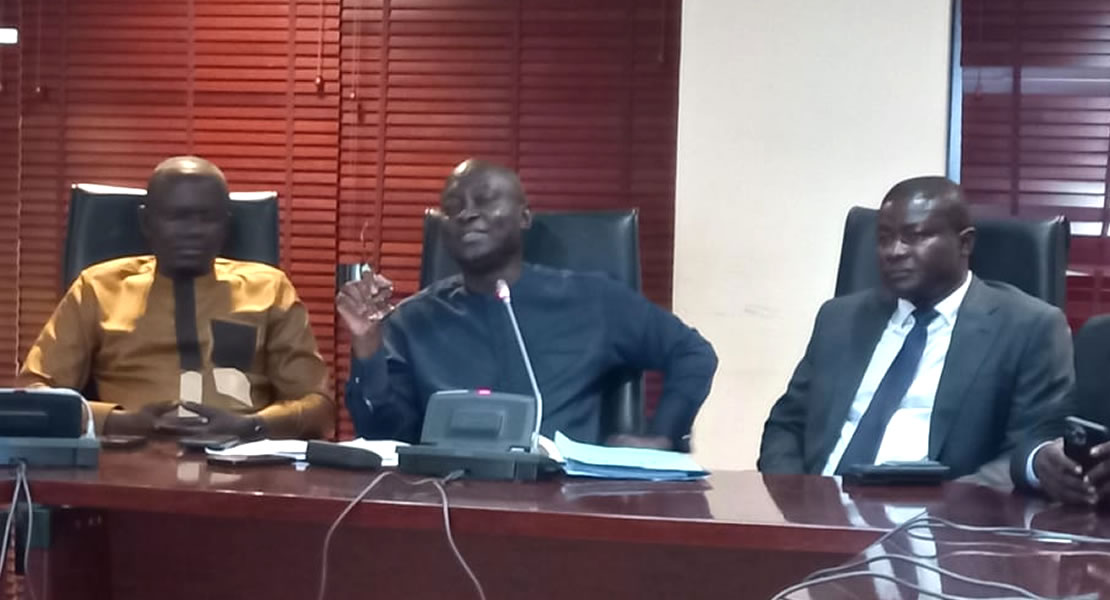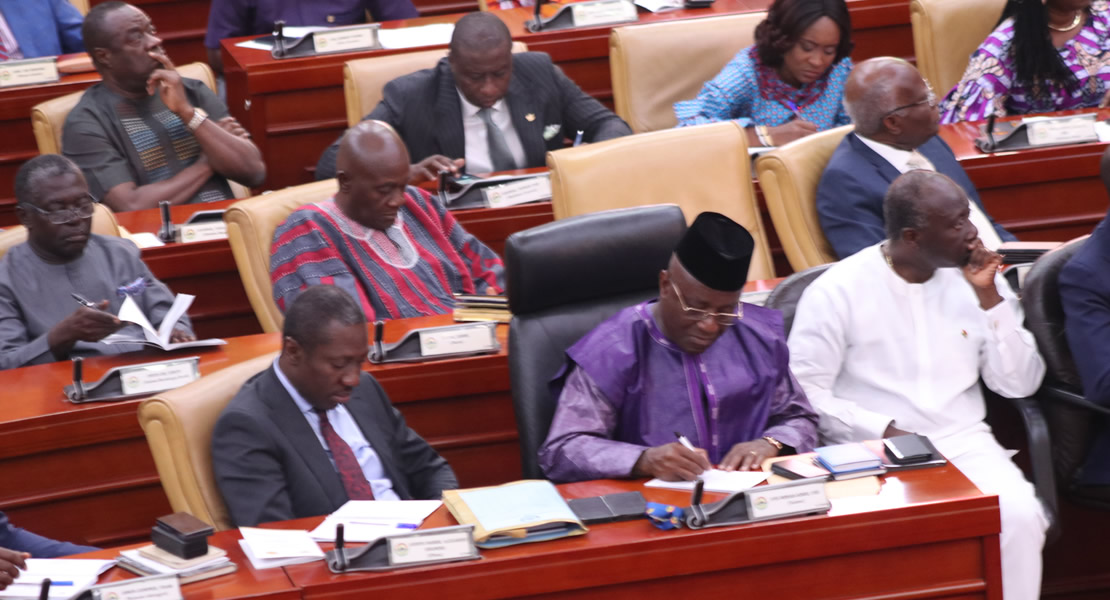
Chairman of the Mines and Energy Committee of Ghana’s Parliament Samuel Atta-Akyea has said the policy of “take or pay agreement” by the previous John Mahama Dramamine led administration has caused the energy sector of Ghana very much.
According to him the previous government signed several energy agreements which were not needed and sighted the AMERI deal which host the nation five hundred ten million dollars $510milion.
The Abuakwa South lawmaker at a press conference on Wednesday, June 14, 2023 used the opportunity to set the records straight and outline several measures taken by the current government led by President Nana Akufo-Addo making sure that Ghanaians get the cheaper price in terms of energy.
Mines and Energy Committee chair flank by three of his colleagues from the Majority side of the House, was setting the records straight on earlier press conference held by the Mines and Energy Committee from the Minority side of the House.
He further pointed out that as part of his research it has come out clear that take or pay was a result of the power crises between 2011 and 2016 that gave space to these energy policy, “but that energy crises was not an instance thing; the question is those running the government of the day did they have the sense of the measurement of the energy we had?”
Comparative Analysis of Electricity Tariffs in ECOWAS Member States
On the issue relating to tariffs in ECOWAS Member States, we wish to note that the study under reference was conducted in 2017 and published in 2019 and most of the countries in the study are hydro dependent.
Over the past six (6) years thermal generation has taken over hydro generation in Ghana. Thermal generation therefore is expensive due to cost of fuel and exchange rate dynamics among others. These coupled with idle capacity has made Ghana’s tariff one of the highest in the region.
It is surprising that the NDC will assert that all these agreements were approved by consensus by both sides of the house without objection from the then NPP minority. This is especially so when the rule is that “the minority will have its say and the majority will have its way”.
If today the NDC claims that the agreements were approved by both sides then, would they have the right to blame the Akufo-Addo government for contracting loans which were equally approved by both sides of the house?
To set the records straight, let’s refer to the Ghana Integrated Power Sector Master Plan (IPSMP) which is a work by the Energy Commission and various Ghana energy agencies, which was supported by the Integrated Resource and Resilience Planning (IRRP) Project, with technical and financial support for the IRRP project provided by the United States Agency for International Development (USAID).
Under Generation and Demand of the 2019 IPSMP, the modeling results confirm that there is significant overcapacity in Ghana, that this overcapacity was expected to continue for 5-7 years when the power plants under construction are commissioned.
The report further noted that the reserve margin in 2018 and 2019 were significantly higher than the planned reserve margin of 20%. Furthermore, the overcapacity challenge is expected to continue into the mid-2020s.
The issue therefore about excess capacity is not in doubt, as established by the 370MW AKSA EPA
We note that the AKSA Emergency Power Agreement (EPA) after expiration on 31″ July, 2022 was renegotiated by ECG with better terms for 15 years, with a dispatch guarantee of 40%. This is far better than the full take-or-pay arrangement under the expired EPA.
A tariff of USD0.093478/kWh for the first 10 years
A Tariff of USD0.085978/kWh for the last 5 years
Compared to the expired EPA tariff of USD0.127662k Wh, the new terms are clearly cheaper, as means of reducing the cost of generation, using natural gas. In addition, the deployment of this plant, taking into consideration the replacement cost of a new plant to meet the demand is optimal.
205MW AKSA PPA
With regard to the 205MW new AKSA PPA, we note that it is a take and pay agreement with a 40% dispatch guarantee to cover the day-to-day operation and maintenance expenses of the plant. It also comes with no payment and government guarantees. Furthermore, it is meant to provide system reliability in the middle and the northern belts of the country based on a system reliability study by the Ghana Grid Company (GRIDCo). To achieve the objective of reliability, there is the need to have a level of guaranteed dispatch of the plant.
The dispatch guarantee provided for in the new terms for contracting PPAs is also a gradual means of reducing the cost of excess capacity payment that has plagued the sector from the numerous take or pay agreements. The non-dispatch of this plant will save the country 60% of the cost compared to the original contract.
On a similar issue raised by Dr. Kwabena Donkor concerning Asogli and Karpower PPAs, we wish to state that there is no 3rd PPA for Asogli. Neither has the Karpower PPA been extended to a regular PA of 20-25 years. Negotiations for these PPAs are still underway.
Excess Capacity Charge Payments
On the issue of idle capacity, between 2017 and 2020, the annual cost of idle capacity ranged between US$ 105.4 million and US$ 373.7million per year. Over the period, a total amount of US$ 368 million had been paid for idle capacities and a further US$ 600 million had been paid for the cost of reserve margins totaling US$968million.
Gas related issues
The claim regarding gas pricing especially the Tema LNG pricing is devoid of facts, misleading and demonstrates lack of knowledge and understanding of the gas sector. First and foremost, the Tema LNG contract is for 17 years, not 20 years. Indexing LNG price to crude oil price is the normal business practice in the industry. Because LNG is globally traded, it is normally indexed to Brent Crude for supplies coming from outside of North American or Henry Hub gas price for supplies from North America.
It is therefore no surprise that, all the previous LNG contracts including those signed under the NDC government were also linked to crude oil price.
 Contrary to the NDC’s claims, the Sankofa gas price signed under the NDC government is not being sold today at US$6.78/MMBtu but rather, US$10.05/MMBtu. Regarding Tema LNG, GNPC negotiated a fixed regime of US$7.7/MMBtu in 2019 for 2 and half years, subject to renewal. This notwithstanding, through negotiations, the LNG supply has been deferred with no take or pay liability, to a later period where projections indicate significant deficits to merit LNG importation.
Contrary to the NDC’s claims, the Sankofa gas price signed under the NDC government is not being sold today at US$6.78/MMBtu but rather, US$10.05/MMBtu. Regarding Tema LNG, GNPC negotiated a fixed regime of US$7.7/MMBtu in 2019 for 2 and half years, subject to renewal. This notwithstanding, through negotiations, the LNG supply has been deferred with no take or pay liability, to a later period where projections indicate significant deficits to merit LNG importation.
Interventions to address the Situation
The President Akufo-Addo government has programmed and carefully made maior interventions since 2019 to significantly minimise the impact of the idle capacities and effects of emergency power agreements on the energy sector. As you are aware the Energy Sector Recovery Programme (ESP) was instituted and an inter-ministerial task force put in place to address the oversee the implementation of the proposed initiatives.
Key among them are, the establishments of the Cash Waterfall Mechanism (CWM) where there is a transparent sharing of Energy Sector revenues and more specifically ECC’s weekly collected revenues to all players in the electricity value chain such that entities that supply ECG with electricity and related services will always receive some streams of income to keep them liquid.
Within the CWM, the Natural Gas Clearing House has also evolved to ensure that all Natural Gas (NG) resources are being monitored and payments made to ensure the gas providers are also liquid.
One challenge encountered was the limited security of supply due to unavailability of alternative fuels. The NPP Government in this regard has provided alternative fuel sources to address shortages in Natural Gas (NG) supply. Currently there are stocks of LCO, HFO and DFO for use in the event that NG supply is interrupted. Power Plants with capability to use alternative fuels are therefore available to support national energy needs.
The reverse flow of natural gas from the western corridor to the eastern corridor project is completed. This brings significant volumes of natural gas for use by thermal power plants in Tema, and Kpone.
Relocation of the Karpowership from Tema to Takoradi also resulted in a major drop in tariff for the power plant when it switched from the use of HFO to natural gas. This also brought significant savings to GNPC under the NDC signed Sankofa contract.
PPA renegotiation exercise is also underway to downsize invoices raised for payment by ECG. Currently, the renegotiation has led to significant reduction in invoices from AKSA, and the CENIT plants. Renegotiation with Cenpower, Amandi, Karpower and Sunon Asogli will soon close with significant benefits to the people of Ghana.
The Nana Akufo-Addo-led government is very much aware of the critical role the Energy Sector plays in the economy of Chang and is focused on addressing the challenges. Government will therefore not yield to distractions from the NDC.
Kwaku Sakyi-Danso/Ghanamps.com